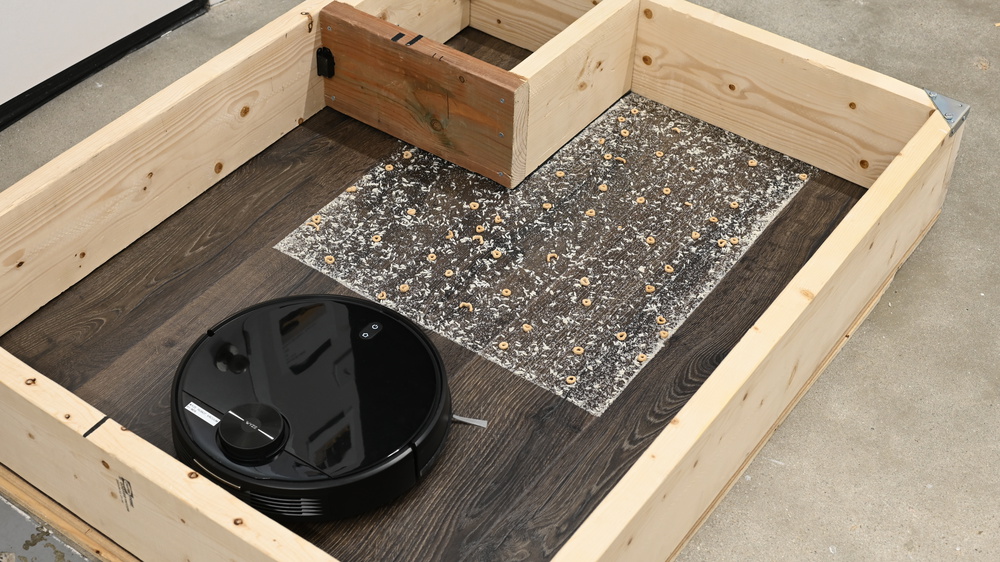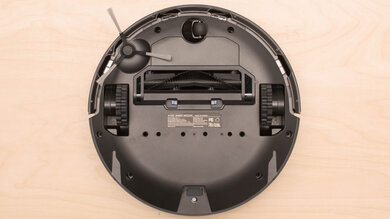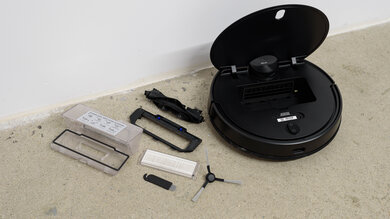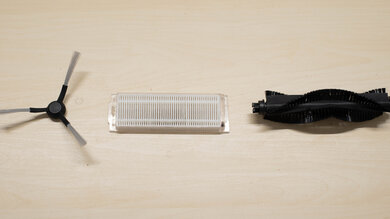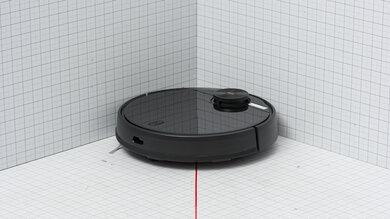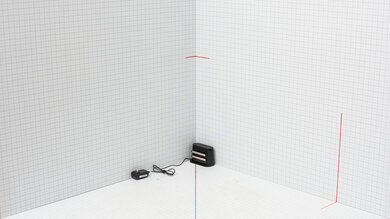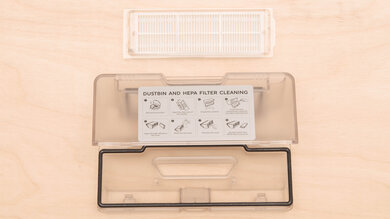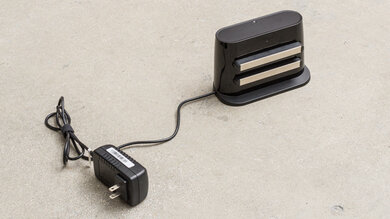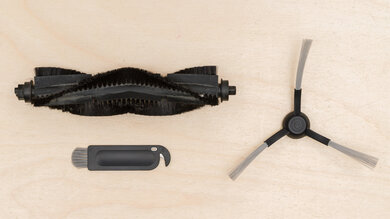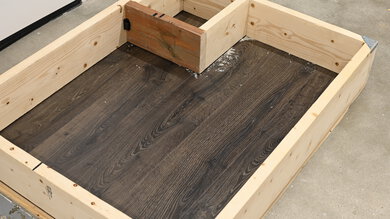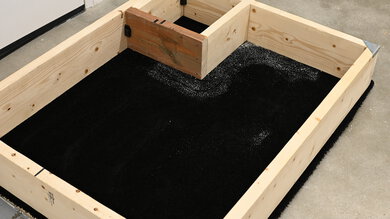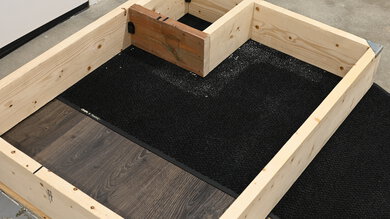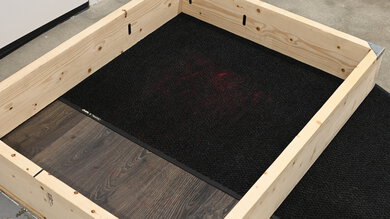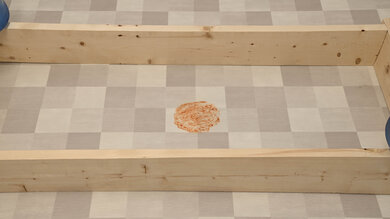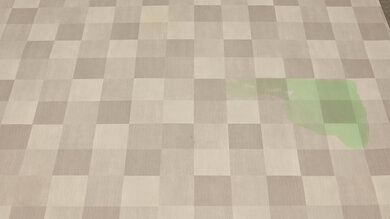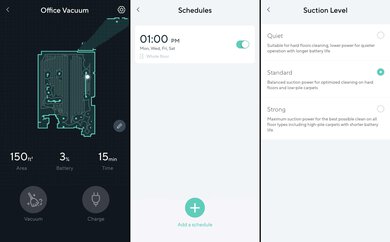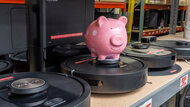The Wyze Robot Vacuum is a budget robot vacuum. It features a wide range of automation capabilities and LIDAR mapping, allowing you to schedule cleaning sessions for specific rooms and set up virtual no-go zones for areas that you don't want to enter. It also features a HEPA exhaust filter that helps it seal in fine allergens. However, it doesn't have a mopping system and isn't compatible with a self-emptying base station.
Our Verdict
The Wyze Robot Vacuum is inadequate for cleaning a household with multiple floor surfaces. While it's good at cleaning up hard floors, it leaves a lot of fine material behind on carpets, especially along edges and in corners. It also misses pet hair embedded in carpet. It can't avoid small items due to its lack of a real-time obstacle avoidance system, so you'll have to declutter before it cleans, or it might suck up a sock or get tangled in a cable. It doesn't have a self-emptying docking station, so you'll have to clean the dustbin manually. And with no mopping system, you can't expect it to clean stains.
-
Good hard floor pickup.
-
Easily cleans up debris directly under its brushroll in both high- and low-pile carpets.
-
No self-emptying docking station means manual dustbin emptying.
-
No mopping system.
-
Leaves fine material along wall edges and in corners on carpet.
-
Has difficulty picking up pet hair embedded in low-pile carpets.
-
No obstacle avoidance system means it can't detect or avoid small objects.
The Wyze Robot Vacuum is a poor choice for cleaning up pet hair. It struggles to pick up pet hair embedded in carpets, and its lack of an obstacle avoidance system means it can't detect pet toys or pet waste and will run into them. There's no mopping attachment to allow it to clear away tracked-in mud and dirt. It also doesn't have a self-emptying docking station, so you'll have to manually empty pet hair from the dustbin. Thankfully, its brushroll is easily removable, though it can take a bit of time to clear tangled hair. It also has a HEPA filter to seal in allergens, and you'll find it fairly quiet around your pets.
-
Has an allergen-trapping HEPA filter.
-
No self-emptying docking station means manual dustbin emptying.
-
No mopping system.
-
Has difficulty picking up pet hair embedded in low-pile carpets.
-
Likely to scrape against, run over or suck up pet waste.
The Wyze Robot Vacuum does a good job cleaning hard floors. It picks up most debris and cleans an area thoroughly enough to pick up material scattered around by its side brush, but it leaves some fine material along wall edges. It'll need a second pass to get everything.
-
Good hard floor pickup.
-
Cleans a hard floor area thoroughly, including material scattered by the side brush.
-
Leaves a bit of fine material along wall edges.
The Wyze Robot Vacuum delivers reasonable performance cleaning up carpets. It performs decently, picking up medium and large debris, especially in high-pile carpets, but struggles with fine material along edges and in corners. It performs a little worse with fine material in low-pile carpets, leaving even more fine debris behind since it lacks the power to pull in fine material from the sides of its brushroll.
-
Easily cleans up debris directly under its brushroll in both high- and low-pile carpets.
-
Leaves fine material along wall edges and in corners on carpet.
The Wyze Robot Vacuum offers mediocre performance vacuuming up pet hair. It picks up pet hair lying loosely on top of low-pile carpets, but its brushroll lacks the agitation necessary to move deeply embedded pet hair, leaving a lot behind.
-
Picks up pet hair lying on low-pile carpet surface.
-
Has difficulty picking up pet hair embedded in low-pile carpets.
The Wyze Robot Vacuum does a poor job of handling obstacles. It can detect and avoid large obstacles like furniture in an average room, but it can't detect any object smaller than a pair of shoes and will run over, suck up, or get stuck on objects like USB cables, extension cables, socks, and pet waste. You won't be able to use this robot vacuum in a cluttered house very easily.
-
No obstacle avoidance system means it can't detect or avoid small objects.
-
Likely to scrape against, run over or suck up pet waste.
-
May get stuck on USB cords and extension cables.
- 5.6 Multi-Surface Household
- 4.7 Pets
Performance Usages
- 7.5 Debris Pickup: Hard Floor
- 6.7 Debris Pickup: Carpet
- 6.0 Debris Pickup: Pet Hair
- 4.8 Obstacle Handling
Changelog
-
Updated Jun 18, 2025:
We've added text to this review for the new tests added in Test Bench 1.0.
-
Updated Jun 12, 2025:
We added the SwitchBot K10+ as an example of a budget robot vacuum equipped with a self-emptying multifunction docking station.
- Updated Jun 05, 2025: We've converted this review to Test Bench 1.0, which updates our performance testing to include new tests to evaluate Obstacle Adaptability, Obstacle Avoidance, Height Clearance, and Threshold Clearance. We've also introduced new performance usages. For more information, see our changelog.
-
Updated Feb 07, 2025:
We did a minor rewrite of this article to align with more recent robot vacuum reviews.
- Updated Aug 22, 2024: We've added a link to the eufy L60 in the 'Low-Pile Carpet Pick-Up' section of the review to provide an alternative that performs better on low-pile carpeting.
Check Price
Differences Between Sizes And Variants
The Wyze Robot Vacuum is available in one color variant: 'Black.' You can see the label for the unit we tested here.
If you come across another variant or yours is different, please let us know in the comments, and we'll update our review.
Compared To Other Robot Vacuums
The Wyze Robot Vacuum is a robot vacuum with good performance on bare floors and decent performance on high-pile carpets with great battery life, LIDAR-based navigation, and efficient smart pathing. Its main issue is its lack of a self-emptying docking station, which is quickly becoming standard. It can't offer the self-empty convenience of the similarly-performing eufy L60 or SwitchBot K10+, though the SwitchBot has such a tiny dustbin that it can't clean for long without it. The Shark PowerDetect RV2820ZE is another example of a similarly-performing alternative with a self-empty docking station.
To see more options, check out our lists of the best robot vacuums, the best robot vacuums for pet hair, and the best robot vacuums for carpet.
The eufy L60 and the Wyze Robot Vacuum are pretty evenly matched robot vacuums with similar feature sets and designs. The eufy is the better option for homes with a lot of carpets or rugs, thanks to its 'BoostIQ' feature, which can automatically increase its suction power setting depending on the surface it's on. The eufy is also marginally easier to maintain and has a bigger dustbin that you won't have to empty as often. Meanwhile, the Wyze delivers better debris pickup performance on hard floors. It feels better built, too.
The Wyze Robot Vacuum is better than the Shark AI Ultra Robot. The Wyze feels sturdier, is easier to maintain, clears away more pet hair, does a better job on bare floors, and has a markedly superior companion app. However, the Shark is compatible with a self-emptying base station to reduce hands-on maintenance requirements.
The Wyze Robot Vacuum is better than the iRobot Roomba i3. The Wyze has fewer parts requiring regular maintenance, incurs lower recurring costs, lasts longer on a single charge, and delivers better performance on bare floors and carpets. However, the iRobot does have an automatic surface adjustment feature and a self-emptying function that reduces hands-on maintenance requirements.
The Wyze Robot Vacuum is better than the eufy RoboVac 25C. The Wyze feels better built, is easier to maintain, has a longer battery life, and delivers better debris pickup on most floor types. It also has a LIDAR sensor, which results in much faster and more efficient pathing than the eufy's random-pathing system.
The Wyze Robot Vacuum is superior to the iRobot Roomba 694. The Wyze has fewer parts that need periodic cleaning, uses an allergen-trapping HEPA filter, maneuvers itself more effectively, and performs better on bare floors as well as low- and high-pile carpets. You can also use the Wyze vacuum's companion app to set up virtual boundary markers or schedule cleaning sessions for individual rooms. Conversely, the iRobot has a larger dustbin and charges much faster.
The Wyze Robot Vacuum is slightly better than the SwitchBot K10+ overall. Though the Wyze doesn't come with a self-emptying docking station, its dustbin is over twice the size of the SwitchBot's. Performance is roughly similar, and the SwitchBot's mopping system isn't much of an advantage because it's just a pre-moistened disposable mop cloth. However, the SwitchBot's build quality is better, and it's quieter.
The Wyze Robot Vacuum and the Roborock Q5 each have advantages. The Roborock can be bundled with a self-emptying dock, potentially reducing hands-on maintenance requirements. It also has a longer battery life than the Wyze, and you can use its companion app to direct it manually if you get stuck. However, the Wyze feels better built, does a much better job of sealing in allergens, and takes less time to recharge.
The Roborock S7 MaxV is better than the Wyze Robot Vacuum. The Roborock has both a LIDAR sensor for quick mapping and a front-facing camera for spotting and identifying potential hazards in real-time. Unlike the Wyze, it also has an advanced mopping system that's quite effective in scrubbing away stains. Lastly, it's fully compatible with two types of self-emptying stations, the pricier of which refills its water tank, washes its mopping pads, and empties its dustbin. The Wyze is a good option if you don't need those additional features and simply want a LIDAR robot vacuum with good overall debris-pickup performance.
The Wyze Robot Vacuum is better than the eufy RoboVac G20. The Wyze has a more advanced LIDAR mapping system that enables it to store a permanent map of its coverage area, meaning you can use its companion app to schedule cleaning sessions for specific rooms or set up virtual boundary lines. The Wyze also feels better built, has fewer parts that need periodic cleaning, incurs lower recurring costs, does a better job of dealing with pet hair, is more maneuverable, and is more effective in sealing in fine particles. Conversely, the eufy has a slightly larger dustbin and weighs less.
The Wyze Robot Vacuum and the iRobot Roomba j7/j7+ each have advantages. The iRobot provides a more hands-off cleaning experience, with real-time object identification to spot and avoid hazards like pet waste, automatic power adjustment for different floor types, and compatibility with a self-emptying base station. That said, the Wyze offers better overall debris pickup performance and has a longer battery life.
The iRobot Roomba i4 and the Wyze Robot Vacuum each have advantages, so one may suit you better than the other, depending on your needs. The iRobot has a larger dirt compartment, requires less time to charge, and delivers better performance on high-pile carpets. Conversely, the Wyze is less demanding in terms of maintenance requirements, incurs fewer recurring costs, has a longer runtime in its least powerful suction mode, and cleans debris more effectively on bare floors.
The Wyze Robot Vacuum is better than the iRobot Roomba 675. The Wyze is easier to maintain, performs better on most surface types, does a better job of clearing away pet hair, and has a more advanced LIDAR mapping sensor, which results in superior maneuverability and a more robust suite of automation features, like support for no-go zones and scheduling for individual room cleaning sessions.
The Roborock S6 and the Wyze Robot Vacuum are very similar robot vacuums, but the Roborock is better for most uses. The Roborock's dirt compartment is much bigger, and it has a better battery performance. It also has an automatic surface type adjustment feature. On the other hand, the Wyze is easier to maintain and delivers significantly better performance on high-pile carpets.
The Ecovacs DEEBOT OZMO T8 AIVI is better than the Wyze Robot Vacuum. The Ecovacs has a more advanced mapping and navigation system, which combines a LIDAR sensor with a camera that allows it to spot and react to hazards in front of it in real-time. It also feels better built than the Wyze, cleans carpets better, has a larger internal dustbin, and has a longer battery life. It's also capable of mopping up stains, though its mopping system is entirely passive and not especially efficient, and is fully compatible with a self-emptying station. That said, the Wyze is far more affordable and delivers superior performance on bare floors.
The Wyze Robot Vacuum is better than the Shark AI Robot. The Wyze's LIDAR mapping sensor allows for quicker, more precise room mapping. It has a considerably better companion app, though the Shark does offer a similarly broad suite of automation features, like support for no-go zones. The Wyze also feels better built, is more effective in clearing away pet hair, and is easier to maintain. However, the Shark has a larger dustbin and a longer battery life.
The Wyze Robot Vacuum and the Roborock E4 have a very similar look and performance, but the Roborock is better for most uses. The Roborock has a larger dirt compartment, has a longer maximum battery life, and clears more pet hair from carpets. On the other hand, the Wyze has a more advanced navigation system, and its app allows you to set virtual boundaries for the vacuum and create cleaning schedules for individual rooms, which isn't possible with the Roborock.
The iRobot Roomba 981 and the Wyze Robot Vacuum have different strengths, and you may prefer either one depending on your needs. The iRobot can automatically adjust its suction power depending on the surface type it's cleaning, and it delivers better performance on bare floors as well as low-pile carpets. On the other hand, the Wyze delivers much better performance on high-pile carpets, and its companion app allows you to set virtual boundaries to keep the vacuum out of certain areas.
The Wyze Robot Vacuum is better than the eufy RoboVac G30. The Wyze has better build quality, fewer parts that need to be cleaned regularly, lower recurring costs, a longer maximum battery life, and a more advanced LIDAR mapping system that allows you to set up virtual boundary markers or schedule cleaning sessions for specific rooms. It also delivers better performance on all surface types. Meanwhile, the eufy has a larger dustbin and an automatic suction power adjustment feature.
The Wyze Robot Vacuum is a better vacuum than the yeedi K650. The Wyze delivers better performance on all surface types and has much better automation features. It also has a better build quality and is easier to maintain. On the other hand, the yeedi has a bigger dirt compartment, charges more quickly, and has a longer maximum battery life.
The Wyze Robot Vacuum is slightly better than the Roborock S4 Max. The Wyze has fewer parts that require regular maintenance and delivers superior performance on bare floors as well as low- and high-pile carpets. While the Wyze charges a lot faster, the Roborock has a longer maximum runtime, but it's worth mentioning that this can vary in the real world. The Roborock also maneuvers itself more effectively and has a larger dirt compartment.
Test Results
Its build quality is great. The vacuum is made of hard plastic and has a glossy black top with a cover you can lift to access the dirt compartment. The rubber wheels feel durable, but the dirt compartment feels somewhat fragile. It's very easy to assemble out of the box since you just need to attach the side brush and set up the dock.
This vacuum is passably easy to maintain. There are quite a few parts that need to be serviced regularly, but they're all easy to access. The app will remind you to replace certain parts like the HEPA filter, side brush, and brushroll.
The dirt compartment is located under the glossy black cover on top of the vacuum and can be easily lifted free by pressing the grooves on its sides. Empty it over a garbage can whenever it's full. Taking it out or putting it back in triggers a voice notification.
The HEPA filter can be unclipped from its slot in the dirt compartment very easily. Use the brush on the included cleaning tool to remove any debris every two weeks.
The brushroll tends to get wrapped with hair, which will pull the brushes in, making them less effective. If hair wraps around the bearings at the ends of the brushroll, the brushroll will become harder to spin since the hair tangles increase friction on the mechanism. To remove the brushroll, lift the cover under the vacuum and pull it out. The cleaning tool does make it a little easier to cut away any tightly bound hair, but longer strands can be a bit of a hassle to deal with, as they tend to get wrapped around the bearings. The manufacturer doesn't say how often you should clean it, but you should clean the bearings and clear any hair tangles with the cleaning tool regularly.
Unlike a lot of other robot vacuums, the side brush isn't fixed in place with a screw, and you can pull it out of its slot pretty easily. It isn't especially hard to clean, either. You should clean it about once a month.
You should also clean the sensor regularly by wiping it with a soft cloth.
This vacuum has fairly high recurring costs. There are a few parts that need regular replacing. Conveniently, you can use the Wyze app to track how many hours of cleaning time are left until each part needs replacing.
- HEPA filter: It should be washed every two weeks and replaced every three months or after 150 hours of use. You can find a replacement here.
- Side brush: You should replace it every three months or after 200 hours of use. Replacement brushes are only sold as part of the Maintenance Kit and can't be purchased individually.
- Brushroll: You should replace it every six to 12 months or after 300 hours of use. You can find a replacement here.
You can also get all of these components as part of a 'Maintenance Kit,' which includes:
- 4x HEPA filters
- 2x brushrolls
- 4x side brushes
The Wyze Robot Vacuum has only a simple charging dock.
In the same cost category, the budget SwitchBot K10+ has a self-emptying multifunction docking station.
This vacuum has excellent battery performance. On its most powerful Strong mode, it provides just over an hour of continuous cleaning time. If you use the lower-power Quiet mode, it lasts for just over two hours. It'll be sufficient for cleaning most large rooms, though it's worth noting newer alternatives like the Roborock Q5 can last even longer on a charge. When the remaining battery life reaches less than 20 percent, it stops cleaning and tries to return to its dock. The LED indicator light on top will start to blink yellow as well. It takes about 3.5 hours to recharge, which isn't too long, although some robot models charge much more quickly, like the iRobot Roomba 614.
The Wyze Robot Vacuum doesn't have many extra features. Two buttons are on the top: Power and Home. Pushing the Power button once will start or pause a cleaning cycle, while holding it for three seconds will turn the vacuum on or off. The Home button sends the vacuum back to its dock. You can also use the app to set the suction power setting to Quiet, Standard, or Strong, but you have to do it manually. Unfortunately, the Wyze can't automatically adjust those settings depending on the surface it's on, unlike the Roborock E4.
The Wyze Robot Vacuum delivers decent performance on high-pile carpets. It's good at dealing with medium-sized and large debris on this surface type, though you still might have to clean up with a manual vacuum to deal with debris left in corners and along walls. You might also want to have it run another cleaning session to clear away finer debris that's been worked into carpet fibers.
We initially encountered some difficulty testing this vacuum on our black sample carpet, as its cliff sensors would trigger and cause it to stop moving. To get around this issue, we covered the sensors with masking tape. This isn't a solution we recommend for actual day-to-day use, but it's worth keeping in mind if you live in a home with especially dark-colored carpets.
Its performance on low-pile carpets is okay. The vacuum will need to make an extra pass or two to deal with finer debris that's been worked deep into carpet fibers, but it's quite good at picking up larger debris. If you want a robot vacuum that provides better performance on this surface type, the eufy L60 is a good option.
The airflow performance is good for a robot vacuum. The Wyze doesn't deal with heavier debris as easily as a higher-end model like the Roborock S8, but it'll still outperform the vast majority of similarly priced alternatives.
The Wyze Robot Vacuum isn't very noisy, especially when compared to most manually operated vacuums. However, you still might want to consider an alternative like the eufy RoboVac G20 if quiet operation is a priority.
This vacuum is good at adapting to typical household obstacles. It has no trouble cleaning under low furniture and doesn't get stuck. Though it uses its bump sensor frequently, it marks large obstacles like floor-length mirrors on its map and will avoid them after an initial light prodding. It uses the same approach around sled base chairs, cleaning thoroughly underneath while tapping on the horizontal bars, and it's cautious enough not to attempt to climb the chairs' bases where it might get stuck. It also handles tall, thin obstacles like coat racks well, approaching the legs but only lightly touching them and cleaning underneath without moving the coat rack around or trying to climb the legs. It tends to avoid getting in situations where it might get stuck, with the exception of tasseled rugs, which it can't detect, and where it may pull the rug tassels into its brushroll and jam itself.
Obstacle avoidance is bad because the Wyze Robot Vacuum lacks a real-time obstacle avoidance system. It can only detect large, broad-sided obstacles like shoes; even here, it nudges them around and can get so close it might tangle a shoelace in its side brush. It pushes around and sucks up smaller objects like socks and pet waste and might get tangled up in USB cables and extension cords. You'll have to declutter before using this robot vacuum.
The Wyze Robot Vacuum can get under some low furniture. Its low height clearance is about average for a robot vacuum with a protruding LIDAR sensor tower. However, it doesn't have a low enough profile to get under really low furniture.
This robot vacuum can climb short to moderately tall thresholds. However, it lacks specialized lifting hardware to tackle tall thresholds. When it triggers its collision bumper against tall thresholds, it won't proceed any further, even if the map its LIDAR sensor constructed indicates there's room beyond the tall threshold.
The Wyze Robot Vacuum does a great job of sealing in fine allergens, thanks in part to its post-motor HEPA filter.
This vacuum does a poor job of cleaning crevices. It isn't quite powerful enough to draw debris out of deeper cracks. Thankfully, unlike alternatives like the Roborock Q5, its side brush doesn't scatter messes around when lifting debris from cracks.
The Wyze Robot Vacuum has terrible stain-clearing performance. Unlike the Roborock S5, it doesn't have a mopping feature that would allow it to scrub away dried-on stains.
The physical automation features aren't especially extensive. Unlike the Shark EZ Robot Self-Empty, the Wyze isn't compatible with a self-emptying base station. It uses its LIDAR navigation system to map your home as it cleans for the first time. The vacuum will only connect with 2.4GHz Wi-Fi networks, as it won't detect 5GHz networks. If you want to use the vacuum without a network connection, you can use the buttons on the top to either send it back to its dock or have it pause or resume an ongoing cleaning session.
The Wyze companion app is great. You can use the LIDAR-generated map to create virtual boundaries to keep the vacuum out of certain areas or set cleaning schedules for individual rooms. You can also use the app to start, stop, and send the vacuum back to its dock, change the suction power setting, check when parts need to be replaced, see the cleaning history, and check the remaining battery life. You can 'share' the vacuum with other household members so they can control it from their phones.
Comments
Wyze Robot Vacuum: Main Discussion
Let us know why you want us to review the product here, or encourage others to vote for this product.
- 21010
What would be the latency with passive analog connection?
- 21010
Hey, Rtings Team. Are the earcups (or any other dimensions) any different from the original/base Accentum Wireless headphones? I was hoping for larger earcups, but I’m assuming Sennheiser didn’t change any of the dimensions for the new Accentum Plus Wireless.
Hi AbominableDott
When measuring the cups on the Accentum Wireless Headphones and the Accentum Plus, we did not notice a difference in cup dimensions.
The full review has been posted here. Let us know what you think!
- 21010
Hey, Rtings Team. Are the earcups (or any other dimensions) any different from the original/base Accentum Wireless headphones? I was hoping for larger earcups, but I’m assuming Sennheiser didn’t change any of the dimensions for the new Accentum Plus Wireless.
- 21010
is there any difference between 2.5mm in and USB-C in when listening HIFI. Is there decoder inside the accentum plus, or no matte what it uses outer devices’ decoder.
Hello Chris,
We normally conduct our frequency response tests calibrated to 100dB, however, when using the Accentum Plus using the included 2.5mm jack in active mode, we were only able to get 96dB. As such, the results from the following graph were taken at a calibration of 96dB.
In the graph, you can see that if the headphones are plugged in via USB-C Audio, the sound profile remains the same as Active Analog w/ ANC. If you use the headphones in Passive Analog (No ANC), the frequency response will be different (see graph). Note that for wired USB-C and Passive Analog, we were able to achieve over 96dB as Active Analog has a dB limiter. Consequently, When the headphones are on, the decoder used is the onboard decoder of the headphones. When the headphones are powered off, the decoder of the input source is used.
I hope this answers your question. Do not hesitate to reach out again!
- David
Early access to our full test results is now available for Insiders! Become an insider to check it out here.

